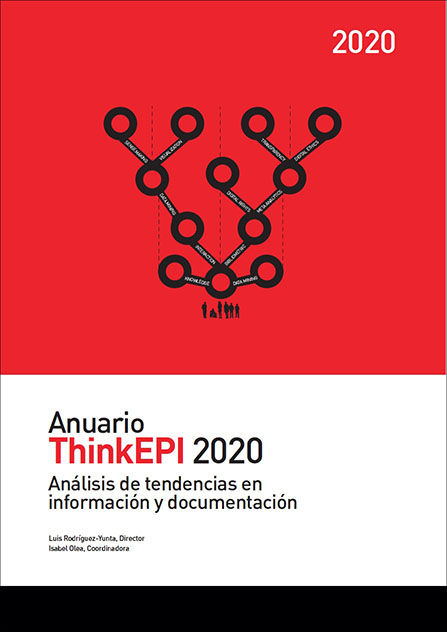Mobile instant messaging services and Covid-19: opportunities and limitations for institutional communication
DOI:
https://doi.org/10.3145/thinkepi.2020.e14d05Keywords:
Covid-19, WhatsApp, Political communication, Public communication, Mobile instant messaging services, Public administrations, GovernmentsAbstract
The Covid-19 outbreak has revealed citizens' great need for information during times of crisis. One of the main channels for accessing information is mobile instant messaging services, which are also essential for social interactions within the context of deep mediatization. The objective of this article is to evaluate the opportunities and limitations that these platforms have offered for institutional communication during the coronavirus crisis. For this purpose, we examined the use of WhatsApp and Telegram channels by public administrations, focusing on the Spanish case in addition to incorporating other international examples. We found that the dissemination of official and verified information, on the one hand, and their ability to counter fake news, on the other, made these services a useful ally for institutions in terms of providing high-quality public service during the coronavirus crisis.
Downloads
References
Casero-Ripollés, Andreu (2020a). "Impact of Covid-19 on the media system. Communicative and democratic consequences of news consumption during the outbreak". El profesional de la informacioÌn, v. 29, n. 2, e290223. https://doi.org/10.3145/epi.2020.mar.23
Casero-Ripollés, Andreu (2020b). "La Covid-19 en el periodismo: un impacto ambivalente". Revista de la Asociación Española de Investigación de la Comunicación, v. 7, n. 14, pp. 2-26. https://doi.org/10.24137/raeic.7.14.1
Castillo-Esparcia, Antonio; Fernández-Souto, Ana-Belén; Puentes-Rivera, Iván (2020). "Comunicación política y Covid-19. Estrategias del Gobierno de España". Profesional de la información, v. 29, n. 4, e290419. https://doi.org/10.3145/epi.2020.jul.19
Chen, Qiang; Min, Chen; Zhang, Wei; Wang, Ge; Ma, Xiaoyue; Evans, Richard (2020). "Unpacking the black box: How to promote citizen engagement through government social media during the Covid-19 crisis". Computers in human behavior, v. 110, 106380. https://doi.org/10.1016/j.chb.2020.106380
Couldry, Nick; Hepp, Andreas (2018). The mediated construction of reality. Cambridge: Polity. ISBN: 978 0 745 68130 6
Couldry, Nick; Mejias, Ulises A. (2019). The costs of connection: How data is colonizing human life and appropriating it for capitalism. Stanford: Stanford University Press. ISBN: 978 1503603660
De-Blasio, Emiliana; Selva, Donatella (2020). "Affective governance during the Covid-19 crisis: Building leadership, trust, and good citizens". Trípodos, v. 1, n. 47, pp. 67-86.
Dutta-Bergman, Mohan J. (2004). "Complementarity in consumption of news types across traditional and new media". Journal of broadcasting & electronic media, v. 48, n. 1, pp. 41-60. https://doi.org/10.1207/s15506878jobem4801_3
España (2018). "Ley Orgánica 3/2018, de 5 de diciembre, de Protección de datos personales y garantía de los derechos digitales". BOE, n. 294, 6 diciembre. https://www.boe.es/buscar/doc.php?id=BOE-A-2018-16673
Fundación Telefónica (2020). Sociedad digital en España 2019. Madrid: Taurus.
García-Santamaría, José-Vicente; Pérez-Serrano, María-José; Rodríguez-Pallares, Miriam (2020). "Portavoces oficiales y estrategia audiovisual en la crisis de la Covid-19 en España". Profesional de la información, v. 29, n. 5, e290513. https://doi.org/10.3145/epi.2020.sep.13
Gibson, James J. (1979). The ecological approach to visual perception. Boston: Houghton Mifflin. ISBN: 978 0898599596
Gil de Zúñiga, Homero; Ardí¨vol-Abreu, Alberto; Casero-Ripollés, Andreu (2019). "WhatsApp political discussion, conventional participation and activism: exploring direct, indirect and generational effects". Information, communication & society, first online. https://doi.org/10.1080/1369118X.2019.1642933
IAB Spain (2019). Estudio anual de redes sociales 2019. IAB Spain. https://iabspain.es/wp-content/uploads/2019/06/estudio-anual-redes-sociales-iab-spain-2019_vreducida.pdf
Klein, Amarolinda Z.; Junior, José-Carlos-da-Silva-Freitas; Da Silva, Juliana-Vitória-Vieira-Matiello-Matiello; Barbosa, Jorge-Luis-Vitoria; Baldasso, Lucas (2018). "The educational affordances of mobile instant messaging (MIM): Results of Whatsapp® used in higher education". International journal of distance education technologies, v. 16, n. 2, pp. 51-64. https://doi.org/10.4018/IJDET.2018040104
López-Tárraga, Ana-Belén (2020). "Comunicación de crisis y Ayuntamientos: el papel de Telegram durante la crisis sanitaria de la Covid-19". Revista de la Asociación Española de Investigación de la Comunicación, v. 7, n. 14, pp. 104-126. https://doi.org/10.24137/raeic.7.14.5
Mannell, Kate (2019). "A typology of mobile messaging´s disconnective affordances". Mobile media & communication, v. 7, n. 1, pp. 76-93. https://doi.org/10.1177/2050157918772864
Newman, Nic; Fletcher, Richard; Kalogeropoulos, Antonis; Nielsen, Rasmus-Kleis (2019). Reuters Institute digital news report 2019. Oxford: Reuters Institute for the Study of Journalism. https://reutersinstitute.politics.ox.ac.uk/sites/default/files/inline-files/DNR_2019_FINAL.pdf
Rice, Ronald E.; Evans, Sandra K.; Pearce, Katy E.; Sivunen, Anu; Vitak, Jessica; Treem, Jeffrey W. (2017). "Organizational media affordances: Operationalization and associations with media use". Journal of communication, v. 67, n. 1, pp. 106-130. https://doi.org/10.1111/jcom.12273
Salaverría, Ramón; Buslón, Nataly; López-Pan, Fernando; León, Bienvenido; López-Goñi, Ignacio; Erviti, María-Carmen (2020). "Desinformación en tiempos de pandemia: tipología de los bulos sobre la Covid-19". Profesional de la información, v. 29, n. 3, e290315. https://doi.org/10.3145/epi.2020.may.15
Tardáguila, Cristina (2020). "The demand for Covid-19 facts on WhatsApp is skyrocketing". Poynter, 26 marzo. https://www.poynter.org/fact-checking/2020/the-demand-for-covid-19-facts-on-whatsapp-is-skyrocketing/
Downloads
Published
How to Cite
Dimensions


